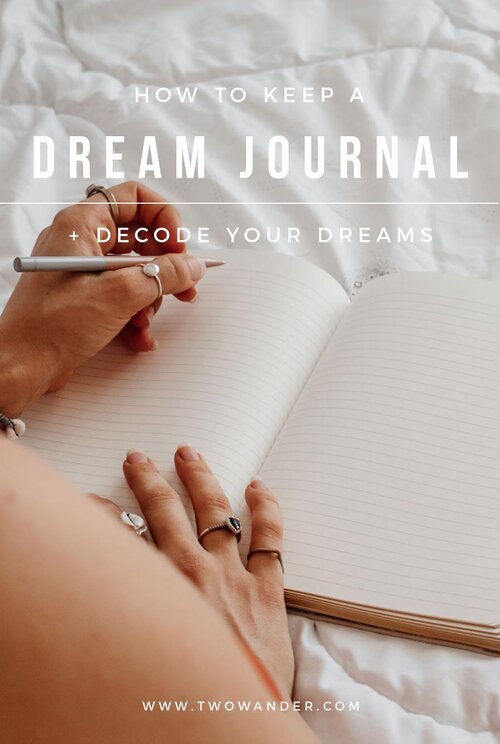How To Keep A Dream Journal And Decode Your Dreams
Please note this post may contain affiliate links. If you choose to purchase through these links, we may receive a small commission at no extra cost to you. By using these links you are directly supporting Two Wander to continue providing you with free content to stoke your curiosity for conscious wandering + holistic well-being. Thank you!
Why To Write A Dream Journal And How To Interpret Your Dreams
Science still hasn’t figured out why we dream (or even why we sleep for that matter). For something that evolutionarily leaves us extremely vulnerable for about 8 hours a night, we wouldn’t still be doing it if it wasn’t incredibly important for us. We know that good quality sleep is crucial for our wellbeing, but what do our dreams mean? Theories suggest it’s a way to process the day’s events and connect your subconscious to your conscious mind, helping to receive insight and valuable knowledge of our lives. Some people believe in their ability to forecast the future or speak with the dead. Either way, they’re certainly not arbitrary and everybody dreams at some point during the night (for up to 2 cumulative hours!), you just might not remember them.
I first starting dream journalling several years ago to try and gain some insight into them, and while I mostly found it hilarious to read back through all the crazy adventures I went on through the night, it was a practice I lost the habit of until I received a beautiful Magic of I dream journal earlier this year and have been religiously doing it ever since! I love this morning ritual now and look forward to what I’ll find out every morning. It’s given me a lot of insight into what I’m currently feeling about certain decisions and events. It’s a free and easy practice that everyone can do to connect to themselves more- read on for how to keep a dream journal and decode your own dreams!
How To Keep A Dream Journal
Dream journalling is a very popular method of understanding in greater depth how you’re feeling, your psyche, and any clues you might be missing in the waking world. It’s been practiced for centuries and can be very effective for gaining insight, encouraging lucid dreaming and increasing creativity.
Writing a dream diary can help strengthen your intuition, gain clarity on your life situations and decisions, have greater self awareness, establish a communication between your subconscious and higher self, which can be very enlightening, and it’s also just downright fun to do and can be very entertaining to look back on some of them (because let’s face it, dreams can get downright weird).
The benefits of keeping dream journals, much like journalling in and of itself, are also increasing a sense of calm and presence in the morning so you’re not just grabbing your phone straight away. It’s a chance to connect with yourself and see if there’s anything your mindbody is trying to tell you and is a very effective way of processing our emotions. A theory from Freud called day residue suggests that our dreams may actually be linked to events that happened during the day before going to sleep. Studies have shown that journalling is an effective stress and anxiety buster and can help increase our sense of mindfulness and happiness. For more information, check out our post on Free-Flow and Gratitude Journalling.
So how do you keep a dream journal? It’s a relatively easy practice to do and can be highly customisable but here are the steps I recommend:
Set the intention to remember
This is quite an important first step because when I was first starting to journal I would either forget my dreams or forget to write them down. What I found helped me most was keeping the journal in plain sight right next to my bed and simply setting the intention to remember my dreams and remember to journal them down as soon as I woke up before going to sleep. Placing the journal on top of your phone (in airplane mode!) can also help so you literally can’t miss it. As with any journalling, it’s also always useful to have a beautiful diary and pen to use so that it’s an extra pleasurable experience. Doing it as soon as you wake up is best before you forget and with actual paper and pen, as opposed to typing, because this wires our brains differently. Doing it every day will also make it easier to remember to do as the habit starts to stick, as well as facilitating dream recall in the first place! This is when you might start to have more lucid dreams too. If possible, waking up without an alarm will also massively affect your ability to recall your dreams.
Write the date and choose a title
It’s important to write the date, and anything significant going on in your life during this period, so that when you look back on your entries over time you can begin to spot patterns between your dreams and certain events and how you react to them. Giving your entry a short title is also useful for synthesising the overall feel of the dream- don’t over think it! The first thing that pops into your mind is the best. Remember this is a practice of intuition so learn to go with your first instinct and don’t second-guess yourself.
Let it all out
Record everything you can remember about your dream including any symbols, numbers, people, places, events, weather, feelings etc. without worrying about spelling, grammar or punctuation, or even full sentences! If you prefer you can write just words, simple sentences or even bullet points. I like to let it all flow out in one big stream of consciousness as it comes to me and as much as I can remember before it slips away. It doesn’t have to be in chronological order either, if you remember something else that happened earlier or in another dream as you’re writing, add that on after too. You can also draw things if this helps! It’s also important to write how you felt not only in the dream but how you feel thinking about it now. Some say it’s best to write in the present tense but I tend to prefer writing in the past.
Read it over and interpret
Look back over what you’ve written, adding in anything else that you might think of now, and see if you can tie it into anything that is currently happening in your life, how those events made you feel, what you instinctively think they might mean, and if you notice any repetitions or patterns with other dreams/events. Adding in a short conclusion and/or analyzation at the end is helpful. You’ll notice that soon you’ll get much better at remembering and interpreting your dreams naturally without overthinking it, as well as understanding what they personally mean for you and how this develops over time.
And that’s it! Again, it’s a really personal practice so you can do whatever feels best for you with some trial and error. Over time you’ll get into a steady habit of writing your dreams down as soon as you wake up and then begin to decode what different things represent for you automatically. Practice makes perfect and it’s definitely a worthwhile practice to keep going! For some tips on what your dreams mean, read on below for some common interpretations:
How To Decode Your Dreams
Interpreting dreams is best done on an individual and personal level. Different symbols, events etc. will mean different things for different people. Furthermore, you might have recurring dreams or similar themes, such as missing a flight, during similar moments in your life. Maybe every time you’re stressed you dream about your teeth falling out, or whenever you’re worried about a specific event you dream about leaving the house with no pants on. This is why it’s really beneficial to keep a dream journal, with the date and any other relevant information to your current life, so that you can start to make connections between your inner and outer world and better understand how your subconscious works.
There are, however, some common elements that many people dream about that can have similar meanings, these are 10 of the most popular:
FLYING - Probably one of the most common types of dream to have, it can represent feelings of freedom and independence but can also indicate that something isn’t right in your life, depending on how you felt whilst flying. It may represent fear, perhaps of failure at work or in your relationships but it can also mean you need to let go and allow yourself to enjoy life more. If you struggle to fly, it could mean that something is holding you back or you set yourself to too high standards. The dream interpretation depends a lot on your emotions at the time and what’s currently going on in your life.
PREGNANCY - Another broad-ranging one, dreams about pregnancy can mean anything from creativity (such as the “birth” of a new project) to fear of change. It could also signify a blossoming new relationship.
FALLING - This dream could show that you’re unhappy with how a certain event has played out in your current life or that you feel overwhelmed and need to slow down. If you’re falling through water, it could mean that you’re developing very strong feelings for someone.
BEING NAKED - This is often taken to mean that you have “imposter syndrome”- you feel like a fake and are afraid of being called out or showing your true colours and self to the world. It could also mean that you already feel called out or wrongly accused of something.
BEING CHASED - This is another one of the most common types of dreams, it’s representative of fear and could mean you’re trying to escape from your own fears or desires in life and that you would rather run away from your problems than face them head-on. It could also reflect a past trauma coming back to haunt you or a shadow habit that is rearing it’s head for you to address.
LOSING TEETH - This is usually linked to some kind of anxiety, that could be about your appearance, speaking your truth or feeling like you’ve said something embarrassing. It could also indicate a fear of rejection or that you’re transitioning to a new phase of life.
TAKING A TEST - Whether it’s taking a test, turning up late for one, or being unprepared for one, a dream about doing an exam could show that you feel underprepared for life in general or are not ready to move on to your next milestone.
INFIDELITY - This is said to be fairly common and can mean you feel some kind of trust, loyalty or communication barrier with your partner (and not that they’re actually cheating). It can also just mean that you’re not getting something you need from the relationship right now.
DEATH - Dreaming about dying or the death of a loved one is obviously extremely distressing but doesn’t, of course, indicate actual death. It can often mean that you’re afraid of change or the unknown or that you feel some kind of situation/habit in your life needs to metaphorically die.
NEEDING THE TOILET - Being unable to find a toilet, needing to go to the toilet, or experiencing some kind of difficulties with toilets, could mean that you feel like your needs aren’t being met in real life. This is a super common one for me when I’m feeling stressed (along with teeth issues)!
Talking it over with someone is also a really good way for gaining more insight. Often if there’s something I’m confused about the meaning of, simply describing it out loud to Sam helps me understand it instantly!
So that’s how to keep a dream journal and decode your dreams. What kind of dreams do you have? Do you interpret them already- if so what are some common meanings you’ve found? If you want to try out the lovely Magic of I dream journal for yourself, use this link and the code TWOWANDER for a 10% discount!
For more information on how to get your best night’s sleep, read our post on How To Create The Ultimate Nighttime Routine.
For monthly Astro and Tarot guidance along with other mystic magic, join me in the Spirit Subscription! ✨




















